|
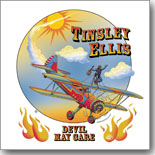 Atlanta, Georgia
bluesman Tinsley Ellis has been around
long enough now to put him well into the
"veteran bluesman" category. First recording in
1982 for Landslide Records, Ellis' latest,
Devil May Care (Alligator), checks in as the
20th album in his prolific discography. He's
frequently labeled as Southern blues/rock, but
to my ears Ellis leans much more heavily into
the blues side of things. He's more of a
guitarist than a singer, but his strong voice is
well-suited for the heavy blues that he's
playing, aptly complementing his guitar work. Atlanta, Georgia
bluesman Tinsley Ellis has been around
long enough now to put him well into the
"veteran bluesman" category. First recording in
1982 for Landslide Records, Ellis' latest,
Devil May Care (Alligator), checks in as the
20th album in his prolific discography. He's
frequently labeled as Southern blues/rock, but
to my ears Ellis leans much more heavily into
the blues side of things. He's more of a
guitarist than a singer, but his strong voice is
well-suited for the heavy blues that he's
playing, aptly complementing his guitar work.
Joining Ellis for Devil May Care is a
strong group of musicians, notably Kevin
McKendree (organ and piano), Steve Mackey (bass)
and Lynn Williams (drums), with horn players Jim
Hoke and Andrew Carney joining the band for
three numbers.
Ellis doesn't waste any time before showing off
his guitar chops, with a strong blues guitar
solo on the opener, "One Less Reason," a
mid-tempo blues shuffle. The 12-bar blues
number, "Right Down The Drain," starts a pattern
of songs that remind of vintage Allman Brothers,
with Ellis playing very fine slide guitar licks
on a 12-bar blues that is as much Southern rock
as it is blues.
Mentioning earlier that Ellis has improved as a
vocalist over the years, that fact is proven on
"Just Like Rain," a slow number that could be
considered a soul ballad. Then he really sings
with conviction on the mid-tempo blues, "Beat
The Devil," defying the devil by claiming that
he's going to be beat him at his own game. The
horn section comes in to add the icing to a very
strong piece of blues cake, made even richer
with Ellis' stinging blues guitar work.
"Don't Bury Our Love" slows down the tempo, with
Ellis' pleading vocals backs by subtle drumming
and organ accompaniment before his blues guitar
ups the energy level later in the song. The band
then gets kind of funky on "Juju," with Ellis
singing about his woman's witchcraft and the
spell on him that turns him into butter. This
one also brings back memories of the Allman
Brothers.
"Step Up" is an up-tempo driving song, followed
by "One Last Ride," with Ellis sounding like two
guitars playing together (it's that Allman sound
again). The guitar, organ and piano go so well
together on this mid-tempo blues.
Ellis brings this gem of an album home with the
rapid-fire "28 Days," with plenty of guitar
effects in use while singing about those four
weeks of torture and pain, and then emits plenty
of suffering on the slow blues "Slow Train To
Hell."
With
so many fine recordings under his belt, it's
hard to say that Devil May Care is
Tinsley Ellis' best. But it certainly ranks
right up there.
--- Bill Mitchell
 Continuing our discussion of the music of
Tinsley Ellis, we get a close look at the
beginning of his career on the new compilation,
Landslide Records, 40th Anniversary
(Landslide). Continuing our discussion of the music of
Tinsley Ellis, we get a close look at the
beginning of his career on the new compilation,
Landslide Records, 40th Anniversary
(Landslide).
The
first cut of this collection dates back to
Ellis' debut album, with "Drivin' Woman" showing
the formation of his "no holds barred" approach
to the blues. Later, we get a live version of
Muddy Waters' "Walkin' Thru The Park," featuring
the vocals of Chicago Bob Nelson, Ellis' singer
on early albums. Ellis and his
band, The Heartfixers, also back legendary blues
singer Nappy Brown on Roy Brown's "Hard Luck
Blues," originally released on Tore Up.
Landslide releases have covered a wide range of
musical styles, from blues to jazz to rockabilly
and southern roots rock. Also notable is the
fact that a number of artists launched their
recording careers on Landslide, notably The
Derek Trucks Band, Webb Wilder, and Widespread
Panic.
Little Feat guitarist Paul Barrere teamed up
with Washington, D.C. wildman Catfish Hodge to
form The Bluesblusters, and from this group we
hear "Phone Don't Ring" and "Elmo's Blues,"
both which have the vibe of Little Feat doing
the blues.
An
Atlanta legend who played in Underground Atlanta
for many years was Piano Red; he's represented
here on a live recording of "Rockin' With Red."
Prolific New Orleans songwriter Dave Bartholomew
also contributed a live recording, "Jazz Fest in
New Orleans."
Contemporary southern blues artist Damon Fowler
is represented by "Make The Best Of Your Time,"
from the 2021 release Alafia Moon. The
late guitarist Sean Costello, who passed away at
the age of 29, is heard on "Motor Head
Baby."
The
second album goes in a lot of different
directions, with not too much blues to be found.
The Derek Trucks Band selection, "Mr. PC," is
more jazzy rock than anything else. We also get
the chance to hear the group that helped launch
the label, the jazz fusion ensemble Col. Bruce
Hampton & The Late Bronze Age, with "King Greed"
and "Walking Woith Zambi" represented here. It's
different, but that was the idea behind
Landslide Records. Giving Atlanta artists of all
styles of music a chance to be heard.
Landslide Records, 40th Anniversary is a
very diverse collection with some good blues to
be heard.
--- Bill Mitchell
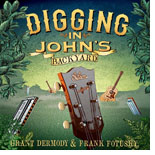
Harmonica ace Grant Dermody and guitarist
Frank Fotusky were brought together by
their mutual appreciation for the music of the
late Virginia Piedmont-style bluesman John
Jackson. It's only appropriate that they teamed
up for the delightful Digging In John's
Backyard (self-released). I don't believe
they actually used a shovel to dig around the
backyard of Jackson's ancestral home, but
instead brought out a lot of old blues songs
that would have influenced Jackson, as well as
one Jackson original.
Dermody gets top billing on this album, but for
my money it's Fotusky's exquisite guitar picking
that steals the show, as he shows his immense
talents on both Fraulini and Gibson guitars.
He's also a nice singer, although Dermody's more
raspy voice has a little more downhome blues
sound. Dermody handles himself well on
harmonica, with the liner notes stating that he
uses the more ergonomic Filisko Method on both
Hohner Harmonicas and Custom Marine Bands.
But
enough of the technical details. Let's talk
about the music. Two of the highlights are
covers of Blind Blake songs: the opening "Hey
Hey Daddy Blues," giving Fotusky his first
chance to show his skills on guitar and vocals,
and "Police Dog Blues," this one with Dermody
singing the blues. The guys are willing to take
it to the riverside on a couple cuts, the
traditional "You Better Lie Down," with
outstanding echo-y harmonica from Dermody, and
Rev. Gary Davis' "Death Don't Have No Mercy," a
slow, more restrained song that gives Fotusky
the spotlight on both guitar and vocals.
Dermody was also associated with Bowling Green
John Cephas (NOTE: one of my all-time blues
favorites!), and he covers "Seattle Rainy Day
Blues," one that Cephas & Wiggins did on their
Shoulder to Shoulder album. Both
performers stand out on Leroy Carr's "Papa's On
The Housetop," Dermody with his harp solo and
Fotusky for his vocal work.
You
just know that Dermody and Fotusky were going to
give a loving rendition of John Jackson's "Boats
Up River," with the pair trading vocals and
Fotusky playing gentle fingerpicking guitar.
There's really not a bad cut on the album, as
the duo also covers tunes from John Lee (Sonny
Boy) Williamson, Carl Martin, Alton Delmore,
Charlie Patton, Skip James, and Leadbelly. If
Piedmont-style blues is your thing, then you
will certainly want to search out the delightful
Digging In John's Backyard.
--- Bill Mitchell
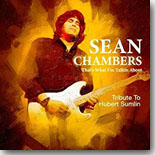 In 1998, guitarist Sean Chambers was
asked to back legendary Howlin’ Wolf guitarist
Hubert Sumlin at a Memphis blues festival. That
experience led to Chambers working with Sumlin
over the next four years as his guitarist and
bandleader (he also appeared on Sumlin’s 2004
album About Them Shoes). Chambers has also
carved out an impressive career of his own,
releasing nine albums since 1998, the most
recent release being a tribute to Sumlin,
That’s What I’m Talkin’ About: Tribute to Hubert
Sumlin (Quarto Valley Records). In 1998, guitarist Sean Chambers was
asked to back legendary Howlin’ Wolf guitarist
Hubert Sumlin at a Memphis blues festival. That
experience led to Chambers working with Sumlin
over the next four years as his guitarist and
bandleader (he also appeared on Sumlin’s 2004
album About Them Shoes). Chambers has also
carved out an impressive career of his own,
releasing nine albums since 1998, the most
recent release being a tribute to Sumlin,
That’s What I’m Talkin’ About: Tribute to Hubert
Sumlin (Quarto Valley Records).
Chambers selected nine classic tunes associated
with Wolf and/or Sumlin, adding an original
tribute tune to the mix. He receives stellar
support from keyboardists Bruce Katz and John
Ginty, bassist Antar Goodwin, and drummer Andrei
Koribanics. The session was produced by Ben
Elliot and recorded at his American Showplace
Studios (Chambers’ previous two releases were on
Elliot’s American Showplace Music label). Elliot
suddenly died a couple of months after the
sessions, so Chambers dedicates the album to him
and Sumlin.
Chambers starts things off with the Sumlin
original, “Chunky,” hewing closely to the
original, but adding a bit of a rocking edge to
it. Next is “Do The Do,” where Chambers delivers
a Wolf-like vocal delivery and scorching slide
guitar, and a funky, rocking take on “Rockin’
Daddy.” The slow burning read of “Goin’ Down
Slow,” written by St. Louis Jimmy, finds
Chambers opening with the spoken-word monologue
Willie Dixon delivered on Wolf’s cover, then he
lays down some stunning fretwork as the tune
progresses.
A
rip-roaring version of “Hidden Charms” is a
standout with Chambers turning a fine vocal and
monster guitar work, followed by a leisurely but
driving version of “Forty-Four,” and a fierce
blues-rock take on “Taildragger,” where Chambers
lays down some of his finest guitar on the
album, which is really saying something.
“Hubert’s Song,” is the lone Chambers original,
but it’s a lot of fun as he pays tribute to
Sumlin and recalls some of their adventures
together.
The
cover of “Sittin’ On Top Of The World,” an
oft-covered tune in many genres from the
Mississippi Sheiks, gets a fresh coat of paint
from Chambers that’s distinct from the many
previous versions. “Howlin’ For My Darling” is a
great vehicle for Chambers as he turns in a
feral vocal and gritty guitar before he
concludes with a terrific rendition of “Louise”
(kudos to Savoy Brown’s Kim Simmonds for
recommending this track, and “Taildragger” to
Chambers).
That’s What I’m Talkin’ About (one of
Sumlin’s favorite sayings) is one of the best
blues rock albums I’ve heard this year. The
passion and enthusiasm that Sean Chambers puts
into this loving tribute to Hubert Sumlin makes
it obvious that he holds a huge amount of
admiration and respect for the late guitarist.
--- Graham Clarke
 On
his latest release, Blue Delta, Johnny
Never (a.k.a. John Carleton) offers some
dazzling acoustic finger-style guitar work on
Delta and Piedmont blues styles. Subtitled “New
and Used Vintage Blues,” Never gives us a
baker’s dozen tracks, eight originals and five
covers, which shake the dust off the country
blues genre and give it a fresh coat of paint.
Never plays all the guitars on the album, and is
ably assisted by John Colgan-Davis (harmonica),
Dave Young or Ken Pendergast (bass), Paul
Patchel or Mark Shustak (percussion), Mac Given
(clarinet), and backing vocalists Holly Hoffman
and Shannon Davidson. On
his latest release, Blue Delta, Johnny
Never (a.k.a. John Carleton) offers some
dazzling acoustic finger-style guitar work on
Delta and Piedmont blues styles. Subtitled “New
and Used Vintage Blues,” Never gives us a
baker’s dozen tracks, eight originals and five
covers, which shake the dust off the country
blues genre and give it a fresh coat of paint.
Never plays all the guitars on the album, and is
ably assisted by John Colgan-Davis (harmonica),
Dave Young or Ken Pendergast (bass), Paul
Patchel or Mark Shustak (percussion), Mac Given
(clarinet), and backing vocalists Holly Hoffman
and Shannon Davidson.
The
title track, “Blue Delta Blues,” is interesting
in that it’s a tribute to the Delta blues, but
played in a Piedmont style, reminding me a bit
of Hacksaw Harney’s approach to the Delta blues.
“Last Fair Deal,” the Robert Johnson classic
swings with a Crescent City vibe, accentuated by
Given’s clarinet, “Black Smart Phone” is a
clever rewrite updating Hop Wilson’s “Black Cat
Bone,” and while Never can’t match the intensity
of Son House’s singing and playing of “Death
Letter” (and, really, who could?), his more
serene version has its charms, particularly his
nimble slide guitar and Colgan-Davis’ harp.
The
Never original “Shake It Up and Boogie” is a
jaunty track that does just that, with thumping
bass, harp, and sweet backing vocals. It’s
followed by “Canned Heat,” a cover of Tommy
Johnson’s late ’20s release that hews pretty
closely to the original, but Never’s delicate
fingerpicking is just wonderful. “Falls Off The
Bone (The Blues in 7/8)” is an intriguing tune,
with a somewhat disheveled arrangement both
vocally and instrumentally, but it works pretty
well so much that I went back and revisited the
track several times. It also provides a nice
segue to Never’s tasty rendition of Roosevelt
Syke’s “44 Blues.”
Kids
in the south today don’t really understand the
struggles of summers with little or no
air-conditioning. Never brings it all back to
life with his bouncy “Witherin’ Heat Blues,”
which also features a clarinet solo from Given.
The somber blues “Whiskey Glass,” features the
clarinet again, and “Dark Night Blues (Murdoch
Blues)” is a gentle folk/blues with lovely,
delicate picking. Big Bill Broonzy’s “Hey Hey”
is a cool driving tune that eases into the final
track, Never’s original, “Blue Eyed Girl,” a
relaxed country blues which teams him with
Colgan-Davis.
Johnny Never’s Blue Delta is a fine set
of acoustic Delta and Piedmont blues. I really
liked his creativity, interchanging the styles
between songs, and breathing new life into the
covers he selected with his playing and
arrangements.
--- Graham Clarke
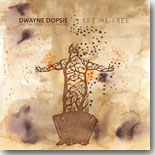 Over
the past year I’ve been listening to a lot of
Zydeco and Cajun music --- a lot of my old
favorites and a few impressive new releases. One
of those impressive new releases is from
Dwayne Dopsie. You can say the music is in
his blood. He’s the youngest son of the
legendary Rockin’ Dopsie, and taught himself
accordion watching videos of his dad and Clifton
Chenier, then recording himself on video to work
on improving his style. About 20 years ago he
started his band, Dwayne Dopsie and the Zydeco
Hellraisers, and has helped bring the music to
the 21st century, mixing in healthy doses of
blues, R&B, funk, rock ‘n’ roll, reggae, and
pop. Over
the past year I’ve been listening to a lot of
Zydeco and Cajun music --- a lot of my old
favorites and a few impressive new releases. One
of those impressive new releases is from
Dwayne Dopsie. You can say the music is in
his blood. He’s the youngest son of the
legendary Rockin’ Dopsie, and taught himself
accordion watching videos of his dad and Clifton
Chenier, then recording himself on video to work
on improving his style. About 20 years ago he
started his band, Dwayne Dopsie and the Zydeco
Hellraisers, and has helped bring the music to
the 21st century, mixing in healthy doses of
blues, R&B, funk, rock ‘n’ roll, reggae, and
pop.
Set Me Free (Louisiana Red Hot Records) is
Dopsie’s 11th release with the Zydeco
Hellraisers and it’s a typical high energy set
of songs that may rank with his finest work.
Don’t plan to put this one on and sit on the
couch because it’s loaded with upbeat,
fast-paced tunes. Dopsie wrote 11 of the 12
tracks.
“Take It Higher,” the opening cut, sets the tone
for the rest of the album. If you’re not moving
something after this one, you might want to call
911. Elsewhere, the irresistible “Louisiana
Girl” finds Dopsie sharing vocals with Erica
Fox, the reggae-flavored title track encourages
us all to pick ourselves up and help each other
along the way during these trying times, and “My
Sweet Chaitanya” is a rocking piece about a
certain girl who drives Dopsie wild.
“DD’s Zydeco Two Step” and “Lafayette Boogie”
are a pair of rousing instrumentals that will
definitely put a hop in your step and set you up
for the second half of the album, which kicks
off with a terrific take on Guitar Slim’s “The
Things I Used To Do,” which is a real family
affair, teaming Dopsie with his brothers Tiger,
Anthony, and Rockin’ Dopsie Jr. (who also appear
on several other tracks) in a tribute to their
late father. The boisterous “Shake Shake Shake”
is a Creole cousin to John Lee Hooker’s “Boogie
Chillen,” describing a youngster’s introduction
to Zydeco.
The
hard-charging “Nobody Gonna Love Me” is another
keeper, mixing blues themes with the Zydeco,
punctuated by a strong guitar solo from
co-producer Brandon David, who shines throughout
the disc. The rapid-paced “I Give It To You”
kicks the album into even higher gear, and the
instrumental “Talk To Me” is tailor-made for the
two-steppin’ crowd. Dopsie closes this wonderful
disc with biographical “Have Those Days Again,”
reflecting on the good times growing up
listening to his father play the music.
Set Me Free has plenty of great music for
those who love the traditional Zydeco sounds and
those newcomers to the music. Dwayne Dopsie and
the Zydeco Hellraisers are definitely one of the
most talented of the modern Zydeco bands these
days and this may be their best release to date,
so don’t miss it!
--- Graham Clarke
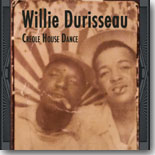 Continuing with the Zydeco/Creole/Cajun theme,
if you are a fan of the music (and I can’t
imagine you not being a fan if you’ve ever
experienced it), Nouveau Electric Records has
issued an awesome 45 called Creole House
Dance, featuring the late Creole fiddler
Willie Durisseau, who passed away in late 2019
at the age of 101. Born in St. Landry Parish in
1918, he and his brother Jimmie made their first
fiddles out of cigar boxes and eventually played
house dances in the 1930s, usually accompanied
by their cousins. All played fiddle or guitar,
no accordions. Continuing with the Zydeco/Creole/Cajun theme,
if you are a fan of the music (and I can’t
imagine you not being a fan if you’ve ever
experienced it), Nouveau Electric Records has
issued an awesome 45 called Creole House
Dance, featuring the late Creole fiddler
Willie Durisseau, who passed away in late 2019
at the age of 101. Born in St. Landry Parish in
1918, he and his brother Jimmie made their first
fiddles out of cigar boxes and eventually played
house dances in the 1930s, usually accompanied
by their cousins. All played fiddle or guitar,
no accordions.
Eventually, Durisseau married and joined the
army, fighting in Okinawa in World War II. After
the war, the social gatherings faded as much of
the community moved to other places to work and
he put his fiddle down to begin working in
construction and raising his family of 14 kids.
In 2017 one of his family members bought
Durisseau a new fiddle and he began playing
again at age 99, recalling some of the songs and
melodies he played at those dance parties some
80 years earlier.
Louis Michot (singer/fiddler of the Lost Bayou
Ramblers and founder of Nouveau Electric
Records) sat down with the Durisseaus in April
and May of 2019 for a series of interviews. On
the two sides, Durisseau and his wife, Irma,
recount some of their memories of those dances.
He’s only able to play for about a minute at a
time (he was 101, remember), but the brief
snippets of songs are interspersed with
conversations between the Durisseaus, Michot,
Zydeco artist Corey Ledet, local cultural
enthusiast Robin Miller, and Houston DJ/Creole
music afficionado J.B. Adams, who discovered
Durisseau had picked up the fiddle again at 100
years old.
While the first side, “Blues a Durisseau,” is
Durisseau playing the fiddle solo and talking a
bit between tunes, the second side, “Willie’s
Zydeco,” features Durisseau playing while Ledet
backs him on accordion. Durisseau plays with a
fire and spirit that belies his advanced age.
Sadly, he was the last known surviving Creole
house dance fiddler when he passed away in
December, 2019, but fortunately Michot managed
to capture this still-potent music with Creole
House Dance.
--- Graham Clarke
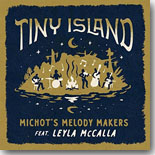 Michot’s Melody Makers (Louis Michot –
fiddle/vocals, Mark Bingham – electric guitar,
Bryan Webre – standup bass, Kirkland Middleton –
drums/percussion) recently collaborated with
Leyla McCalla (cello/vocals) for a great
5-song EP, Tiny Island (Nouveau Electric
Records), which was recorded (and filmed) on a
cool, fire lit March night at Michot’s home in
Prairie Des Femmes, Louisiana on a, you guessed
it, tiny island in a small pond. McCalla
previously guested Michot’s Lost Bayou Ramblers’
2017 release, Kalenda, and Michot
returned the favor by appearing on McCalla’s The
Capitalist Blues in 2018. Michot’s Melody Makers (Louis Michot –
fiddle/vocals, Mark Bingham – electric guitar,
Bryan Webre – standup bass, Kirkland Middleton –
drums/percussion) recently collaborated with
Leyla McCalla (cello/vocals) for a great
5-song EP, Tiny Island (Nouveau Electric
Records), which was recorded (and filmed) on a
cool, fire lit March night at Michot’s home in
Prairie Des Femmes, Louisiana on a, you guessed
it, tiny island in a small pond. McCalla
previously guested Michot’s Lost Bayou Ramblers’
2017 release, Kalenda, and Michot
returned the favor by appearing on McCalla’s The
Capitalist Blues in 2018.
The
EP kicks off with a rousing fiddle-driven tune,
“Two Step de Ste. Marie,” that just seeps into
your backbone and makes you move. McCalla
answers with a haunting Haitian folk song, “Latibonit,”
where she sings of a beautiful valley on the
island, accompanied by the frogs and insects
“singing” in the background along with the
band’s driving rhythm. Michot and McCallas then
share vocals on “Les Plats Sont Tous Mis Sur La
Table” an old country-flavored tune associated
with Canray Fontenot. "Blues de neg francais” is
a lively, almost hypnotic dance tune, and the
closer is a boisterous medley of the Creole
standard “Bluesrunner” and Michot’s “La Lune est
Croche,” which originally appeared on the Melody
Makers’ 2018 release, Blood Moon.
Tiny Island combines Cajun and Haitian
sensibilities into a heady gumbo of music that
sizzles with energy and excitement. Hopefully,
this won’t be the last time that Louis Michot
and Leyla McCalla join forces.
--- Graham Clarke
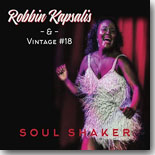 Robbin Kapsalis & Vintage #18 released
Grit in 2017, shortly after representing the
Central Virginia Blues Society at the 2016 I.B.C.
That album was well-received at the time, thanks
to Kapsalis’ sultry, soulful vocals and the
band’s immaculate chops. The core unit (Kapsalis
– vocals, Bill Holter – guitars, Mark Chandler –
bass, and Alex Kuldell – drums) are still in
place for their new release, Soul Shaker
(Bird Song Records), a rock-solid, ten-song set
of blues and soul that shows the band is raring
to go after the lengthy pandemic restrictions
and lockdowns. Also contributing are guests Ron
Holloway (sax), Thomas Williams and Vince McCool
(trumpets) on several tracks. Robbin Kapsalis & Vintage #18 released
Grit in 2017, shortly after representing the
Central Virginia Blues Society at the 2016 I.B.C.
That album was well-received at the time, thanks
to Kapsalis’ sultry, soulful vocals and the
band’s immaculate chops. The core unit (Kapsalis
– vocals, Bill Holter – guitars, Mark Chandler –
bass, and Alex Kuldell – drums) are still in
place for their new release, Soul Shaker
(Bird Song Records), a rock-solid, ten-song set
of blues and soul that shows the band is raring
to go after the lengthy pandemic restrictions
and lockdowns. Also contributing are guests Ron
Holloway (sax), Thomas Williams and Vince McCool
(trumpets) on several tracks.
The
opening track is a truly funky cover of Buddy
Guy and Junior Wells’ “Shake It Baby,”
highlighted by Kapsalis’ vocal, Holter’s sharp
fretwork, and the McCool/Holloway horn section.
The horns stand out on the briskly-paced “Lost
Souls,” this time Williams and Holloway, with
superb contributions from Chandler and Kuldell.
Kapsalis’s smoky, sexy vocal drives the upbeat,
thumping “Boogaloo,” and “Living Large” is a
mid-tempo blues from Deb Ryder sung by Kapsalis
like she’s lived it herself.
“You
Don’t Deserve Me” is a powerful tale of a
relationship turned sour. Kapsalis really pours
her heart into the defiant lyrics and the band
really locks into the groove behind her. The
swinging “Jukin’” finds Kapsalis and the band in
excellent form, and the understated “From The
Heart Of The One” features Kapsalis and Holter
in a cool, soulful setting.
“Silver Spoon” is an autobiographical rocking
blues where the singer tells of her
rough-and-tumble upbringing. The album wraps up
in dynamite fashion with a steamy, smoldering
cover of “Fever,” a rocking version of Lil’ Ed’s
“The Cannonball” and the extended version of the
terrific “You Don’t Deserve Me,” presented in an
“Extended Groove” version that proves you can’t
get too much of a good thing.
Soul Shaker is most definitely a good thing,
too. Robbin Kapsalis & Vintage #18 are in the
zone for this excellent release, which should
get the band a lot of love from blues fans if
there’s any justice in the world.
--- Graham Clarke
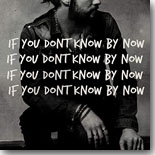 Since I don’t watch American Idol, my only
exposure to singer/guitarist Casey James
has been listening to his previous release,
2017’s Strip It Down, which I enjoyed
very much, and his 2020 release, If You Don’t
Know By Now, which is even better than its
predecessor. James’ first release was a country
album, but the blues was in him and it had to
come out, so his last two efforts have focused
on that genre. The blues world is better for it. Since I don’t watch American Idol, my only
exposure to singer/guitarist Casey James
has been listening to his previous release,
2017’s Strip It Down, which I enjoyed
very much, and his 2020 release, If You Don’t
Know By Now, which is even better than its
predecessor. James’ first release was a country
album, but the blues was in him and it had to
come out, so his last two efforts have focused
on that genre. The blues world is better for it.
James’ vocals and guitar are augmented by
producer Tom Hambridge on drums, with Tommy
McDonald on bass, Mike Rojas on keyboards, and
Rob McNelley on rhythm guitar, along with a horn
section (Emmanuel Echem – trumpet, Bryan
Maggison – sax, Desmond Ng – trombone) and Wendy
Moten on background vocals.
“Live Life,” the opening track features the
horns with the rhythm section getting funky,
while “Shake Some Salt” has a driving southern
rock feel. “Girl’s Got Something” is an
irresistible mid-tempo, country-flavored track,
and “Real” is gritty blues rock. “Don’t Break A
Heart” mixes country and blues quite effectively
with country rhythms but a guitar solo from
James that’s blues through and through. “Here To
Please” is a splendid soul burner that James
really knocks it out of the park, and the catchy
title track is upbeat, peppy soul that really
cooks.
“Wish Me Luck” is a smooth urban blues with nice
B3 accompaniment from Rojas and that sweet horn
section, who also figure prominently on the
Memphis soul ballad “Be Mine” which follows.
“Come On Saturday Night” is a nifty slice of New
Orleans funk with the horns blazing and maybe
the best kazoo solo I’ve ever heard, and
“Nothin’ But Time” keeps that Gulf Coast
feeling, sounding like a long-lost swamp pop
slow dance classic. Meanwhile, the optimistic “A
Better Place” revisits the southern rock/country
vibe.
The
closing two tracks, “Faith” and “(More) Faith,”
are really cool. “Faith” is a moody, swampy,
atmospheric piece highlighted by James’ spirited
vocal and ghostly slide guitar work. “(More)
Faith” serves as an instrumental epilogue to the
previous track and really kicks into high gear
with Hambridge’s driving rhythm and James’ slide
guitar leaving scorched earth in its wake.
As
stated above, I really liked Casey James
previous release, but I absolutely loved If
You Don’t Know By Now and wish I’d gotten to
it sooner than I did. James is a marvelous
vocalist in a variety of genres but has found
his home with blues and soul, and his guitar
work on this album is equally impressive. If you
haven’t checked this release out yet, you
certainly need to go back and pick it up.
--- Graham Clarke
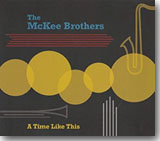 The McKee Brothers return with their third
release, A Time Like This, an album
similar to their two previous efforts in that it
contains an enticing set of originals (16
written or co-written by the brothers and
keyboardist Bobby West) that cover a wide
variety of blues-related styles. Denis McKee
leads the ensemble, providing vocals, guitar,
bass, keyboards, and percussion, and he’s backed
by keyboardist West, vocalist Maxayn Lewis,
bassist Bobby Watson, drummers Steve Stephens
and Vincent Fossett Jr., percussionist Chris
Stevens, and a horn section consisting of Lee
Thornburg and Doug Webb. Guests Larry McCray,
Joey Delgado, Stan Budzynski (guitars) and Tim
Douthit (harmonica) also stop by. The McKee Brothers return with their third
release, A Time Like This, an album
similar to their two previous efforts in that it
contains an enticing set of originals (16
written or co-written by the brothers and
keyboardist Bobby West) that cover a wide
variety of blues-related styles. Denis McKee
leads the ensemble, providing vocals, guitar,
bass, keyboards, and percussion, and he’s backed
by keyboardist West, vocalist Maxayn Lewis,
bassist Bobby Watson, drummers Steve Stephens
and Vincent Fossett Jr., percussionist Chris
Stevens, and a horn section consisting of Lee
Thornburg and Doug Webb. Guests Larry McCray,
Joey Delgado, Stan Budzynski (guitars) and Tim
Douthit (harmonica) also stop by.
The
opener, “How Can I Miss You,” is a laidback
horn-fueled Crescent City blues, while
“Whistleblower Blues” is a funky blues rocker
with a sizzling guest appearance from McCray,
and “It Is What It Is” is a greasy Memphis soul
shuffle. The title track is a smooth R&B groover,
“Realize,” mixing R&B with gospel overtones both
lyrically and musically. “The Legend of Luther
Stringfellow” brings a little swamp to southern
rock, while the gently swinging “Don’t Cha Let
It Go To Your Head” leans toward jazz with nice
accompaniment from Webb on clarinet, and the R&B
tune “Bluer Than You” revisits New Orleans.
“Miracle” has a sweet Motown-pop-R&B feel that
belies the song’s somber message, while “A Scene
From Sunday” looks back fondly at days gone by,
and “Back To Love” (featuring Delgado on guitar)
is an energetic retro pop rocker. “Think It
Over” is a soulful ballad with a touch of the
islands in its rhythms, “Putt Putt Hustler” is a
tough blues shuffle, and “Dawg” is a lively
rocker with McCray guesting on guitar along with
slide guitar from Budzynski. McKee solos on the
moody blues rocker “The Rain,” and the closer
“Surreal Love” is a blues/pop confection.
A
Time Like This has something for any blues
fans, a variety of styles based in the genre,
well-crafted tunes, and outstanding
performances. The McKee Brothers ably handle
them all, with a little help from their friends,
and make this an album worth checking out.
--- Graham Clarke
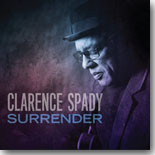 I
can remember buying a copy of Clarence Spady’s
debut album, Nature of the Beast, in the
late ’90s and just being blown away by his
talent as a singer, guitarist and songwriter. It
was hard to believe that it was his first
release. After that, I lost track of him for a
few years, with his label, Evidence Records,
basically shut down. He released an acclaimed
follow-up, Just Between Us, in 2008 for
Severn Records, but unfortunately I never got to
give it a spin. Fortunately, Spady has returned
after another lengthy recording pause with the
superlative Surrender (Nola Blue Records)
that proves to be well worth the long wait. I
can remember buying a copy of Clarence Spady’s
debut album, Nature of the Beast, in the
late ’90s and just being blown away by his
talent as a singer, guitarist and songwriter. It
was hard to believe that it was his first
release. After that, I lost track of him for a
few years, with his label, Evidence Records,
basically shut down. He released an acclaimed
follow-up, Just Between Us, in 2008 for
Severn Records, but unfortunately I never got to
give it a spin. Fortunately, Spady has returned
after another lengthy recording pause with the
superlative Surrender (Nola Blue Records)
that proves to be well worth the long wait.
Surrender consists of six tracks recorded
recently and worked on over a 20-year period,
and three previously unreleased live tracks from
a 1999 appearance at the River City Jazz Café in
Plains, Pennsylvania. There are two songs
featuring material or performances from two
friends who have passed on in Lucky Peterson and
drummer Shorty Parham. There’s also a song
written for Spady’s son, Khalique, who passed
away at age 25.
The
marvelous opening track, “If My Life Was A
Book,” finds Spady reflecting on his life and
career. It has a distinct Memphis soul vibe,
thanks to the B3 from Scott Brown. “Good
Conversation” is a smooth soulful track with a
hint of jazz in its making, in part due to
songwriter Adam Schultz’s Montgomery-esque
guitar solo. Spady covers Lucky Peterson’s “When
My Blood Run Cold,” a slow burning standout with
a powerful vocal performance and masterful
guitar solo, and pays a warm tribute to his late
son on the funky blues shuffle “K-Man.”
The
title track is an emotional, soul-baring
testimony taken in a gospel vein. Spady sings
this one like he lived it, because he has. It
was inspired by a meeting in his church group
that discussed the subject. These performances
are a trademark of his albums, whether he wrote
the songs or not, listeners can sense that he’s
actually lived the lyrics at one point or
another. Spady also covers Z.Z. Hill’s “Down
Home Blues,” giving a fresh, acoustic take to
the much-covered soul-blues standard.
The
three live tracks from 1999 conclude the disc,
and find Spady and his bandmates in fine form.
“Addiction Game” is as deep and autobiographical
as you might imagine, coming from Spady. Mark
Hamza’s Hammond organ drives the simmering
soulful tune and Spady’s fretwork is sublime,
and his late friend Parham plays drums. The
exciting “Jones Falls Expressway” is a ten-plus
minute instrumental inspired from a near-death
experience for Spady and Hamza while driving at
that location. Spady, Lamza, and tenor sax
player Tom Hamilton all get ample space to strut
their instrumental stuff. The closing track,
“Pick Me Up,” is a smooth soul-blues number
about a failing relationship with backing vocals
from Parham.
Clarence Spady doesn’t record very much, but
when he does it’s always something special.
Blues fans should expect to see Surrender
being nominated for, and hopefully taking home,
a few trophies come Blues Awards time.
--- Graham Clarke
 The
amazing Veronica Lewis was all of 17
years old when she released You Ain’t Unlucky
(Blue Heart Records) last year. The young
keyboard prodigy won Blues Artist of the Year at
the 2020 Boston Music Awards, the 2020 Boston
Blues Challenge, and was named 2020’s Best Young
Artist by the New England Music Hall of Fame.
She traveled all over the country to festivals
and venues, dazzling audiences nationwide with
her prodigious keyboard skills and vocals. Her
debut album contains eight tracks, six originals
and two covers. The
amazing Veronica Lewis was all of 17
years old when she released You Ain’t Unlucky
(Blue Heart Records) last year. The young
keyboard prodigy won Blues Artist of the Year at
the 2020 Boston Music Awards, the 2020 Boston
Blues Challenge, and was named 2020’s Best Young
Artist by the New England Music Hall of Fame.
She traveled all over the country to festivals
and venues, dazzling audiences nationwide with
her prodigious keyboard skills and vocals. Her
debut album contains eight tracks, six originals
and two covers.
The
Crescent City-flavored title track opens the
disc, an optimistic tune encouraging the need to
think positive even when things are not as great
as they should be, and it’s a most impressive
start. “Clarksdale Sun” is a rollicking
breakneck boogie, and “Put Your Wig On Mama,”
written by Lewis to her mother, has a Windy City
feel. The album’s first cover, Louis Jordan’s
“Is You Is My Baby,” gets a complete makeover by
Lewis, who transforms it into a splendid slow
blues that really showcases her vocal talents.
“Fool Me Twice” returns to New Orleans with a
vengeance, with several rhythm changes and some
thundering work on the keys. This is one of
three tracks recorded at Lewis’ home on her 115
–year-old upright piano, “Margaret,” the other
two are a fantastic cover of Katie Webster’s
“Whoo Whee Sweet Daddy,” and “The Memphis
Train,” another fast-paced boogie track. There’s
still a lot of life in “Margaret’s” keys, for
sure. The lone instrumental is the
appropriately-titled “Ode To Jerry Lee,” which
is pure dynamite.
The
only problem with You Ain’t Unlucky is
that there just ain’t enough of it, clocking in
at just over 32 minutes. Hopefully, we will be
lucky enough to have a new recording from
Veronica Lewis very soon.
--- Graham Clarke
|